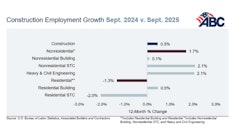
Article originally appeared on thelienzone.com
If a construction disagreement has arisen, one possible solution is litigation. While this may not be an ideal solution, sometimes contractors cannot avoid it. Keep these four things in mind as you litigate a case.
1. Organize your files
The more organized you are in how you organize your records and hand them to your construction lawyer, the less time your construction lawyer is going to need to spend in organizing the documents and learning from the documents, which means you’re going to spend less money in legal fees.
When you organize your documents, use labels for folders and create a timeline of events — both good and bad — so that your attorney can get a head start in the case because you’ve done some of the digestion of the information for him or her by putting the information together in organized ways.
So, number one, organize your files.
Read next: Questions to Ask a Construction Lawyer Before Hiring
2. Ask to be copied on everything
If your attorney is corresponding via email with the other attorney, the opposing attorney or attorneys, ask that you be blind copied on all of those emails; or, if your attorney is uncomfortable blind copying you, forward a copy to you after the fact.
If they file documents with the court, ask for copies of all of those documents so that you can see what’s going on. What arguments are being made by your attorney in the case, by the other attorney against you?
You need to stay informed, and when you’re informed then that does two things. One, it allows you to be at ease with the case because now you know what’s going on. And two, you don’t have to keep calling your attorney and getting an update because you’ll be updated constantly as the case is progressing since you’re being copied on everything, and that should reduce your legal spend.
3. Ask for rough cost estimates
If your attorney says, “well, we need to file a Motion for Summary Judgment in the case,” you should ask the attorney, “well, how much do you think it’s gonna cost, when you think it’ll be ready, and when do you think we’ll get an answer on it?”
Those types of questions are more than reasonable to ask. You should be asking them regularly, and your attorney should be comfortable in giving you a rough estimate.
It may not be perfect, but at least it creates a guideline for the attorney to follow, number one; and, number two, it allows you to understand what your bill may be before you get it at the end of the month so you’re not surprised.
Ask for estimates and you should be able to drive some of your legal costs down just by asking for estimates.
4. Pick a strategy and stick with it
Sometimes clients pick a strategy, we move on that strategy for a few months, then they pick another strategy because they’ve had a change of heart. We move on that for a few months, and they decide that they want to take a different approach. All of that back and forth, that herky-jerky approach to the litigation, costs money because the things you would do under one strategy may be unnecessary on another.
Decide with your attorney in a collaborative way what is the best strategy based on where you’re at, employ that strategy and give it time to work. Avoid back and forth approaches to the strategy in your case and you will reduce your legal fees.



















